"Hyper Fishing Gear" (For fishing really fast. Hat)
"Justifiable Pollack" (Because being Polish is a crime. T-shirt)
"Take a Severe Seating at Second 09" (The punishment for being Polish. T-shirt)
"TNT Yours" (The word 'up' hasn't been invented here yet. T-shirt).
Academically it was an interesting week. I played Rachmaninov's Variations on a Theme by Paginini for my high schoolers. I asked them to write at least five sentences about what images come to mind when they hear the music. I encouraged them to be as creative as possible. For the Koreans, who learn mostly by rote, free-thinking is a bizarre experience. To then take those awkward, spontaneous bursts of creativity and slow them down enough to translate into English must seem like a Hurculean task. They understand the assignment, a few start to doodle while the symphony plays, but most of them stare at their piece of paper as if it were some vast rice patty they have to sow by hand. I write my own thoughts in order to encourage them. I dare not look up for fear of stifling their creativity by making them feel under the microscope of sorts. It turned out alright. Two of the boys in H2 came up with some really neat ideas (none of which I have with me - doh!).
I had an interesting conversation with my teacher co-ordinator (read: boss) last week. For the record, her name is Nam, Ha-young, but we just call her Mrs. Nam. She is this friendly, outgoing woman with a gift for teaching and an excellent grasp of English. She was the person I originally contacted about the job and her mind is a wealth of insights into everything from disciplining children to Korean etiquette.
During a break between classes Friday I struck up a conversation with Mrs. Nam about the 3E2 class (15 year olds) we share. I commented on how hard it is to get the students to stop talking and focus on an activity. Oftentimes they simply ignore me until I am screaming at the top of my lungs for them to pay attention. Mrs. Nam laughed and surprised me when she said it could be worse. They could be well-behaved.
When Mrs. Nam teaches the 3E2 class they are quiet as still water, eyes forward, absolutely motionless, perfect little Korean students. She says their affect is robotic and often times when a student doesn't understand something, they will simply give up trying. "No-ah teachah" they say to her and point to the offensive material. What really came as a surprise was when she pointed to me and said they loved me and my little activities and games.
Slightly confused, I ask if it is the same class. It is. Mrs. Nam, Are you sure? Yes. They love you Stephen, they really do. It isn''t you they are ignoring exactly.
For Most Busanites, English is considered little more than an academic requirement to be fullfilled and forgotten. Though it is considered a cornerstone of a well-rounded education, to most people English is impractical academic drivel. In a lot of ways they are absolutely correct. For most of the residents of Busan, there is simply no reason to be fluent in English. With the handful of resident aliens (like me) scattered throughout the city and the majority of the tourists cooped up in their hotel rooms in Haeundae, there is no earthly reason to be fluent in English. The students planning to study in America, Austrailia or England take it seriously, and many businessmen hire private tutors (highly illegal, actually). However, they make up a tiny slice of the massive human pie called Busan.
The English instruction the children receive is fractured and unfocused. In school they focus on reading and the hagwons specialize mainly in speaking English. The students get little help learning to put their Korean thoughts into written english words. The end result is most people under 25 can make only the most basic conversation with a native English-speaker despite six years of daily instruction.
"In my English classes we focused on vocabular and reading," said Mrs. Nam. "We'd learn hundreds of vocabular words that we'd never use in day-to-day conversation." She said most students become a library of English vocabulary with very little practice applying it. Mrs. Nam earned her English merit badge the only way that truly works: She lived in California for two years.
The end result is a population of young people In Korea who learned english the way I learned trigonometry. I can prattle off all sorts of equations, tangents and imaginary numbers, but I can't design a bridge or calculate the future orbit of Mars. They can read an English book, they can say 'hello' and burn through a vocabulary quiz in a matter of seconds, but they can't tell me how to find the bathroom.
Mrs. Nam told me a story about an encounter she had with a foreigner at a clothing shop earlier that week. The young American strolled into the shop, and in the most basic English possible he asked the clerk if she could point him towards the nearest camera shop. The clerk, a young woman, just stood there gaping at him. He repeated the question, but she was rendered speechless by her education.
Mrs. Nam came to the clerk's rescue and guided the young man to the camera shop. She said that while she talked to the (very relieved) American, people in the store stood and stared at her with an uncomfortable intensity.
"They look right through me," said Mrs. Nam. According to her, this happens whenever she speaks in her near-perfect English with a foreigner. She tried for a few minutes to express her feelings on the subject. All I understood was the it is extremely awkward.
Other Koreans look at Mrs. Nam with a caustic mix of jealousy, curiosity and repulsion. On the one hand, a Korean who speaks English is worldly and highly educated. On the other hand, the alien language emenating from Mrs. Nam's mouth marks her as "one of them," an outsider of sorts, un-Korean. They ostrosize Mrs. Nam with their eyes.
I didn't tell her, but my first impression was this was a manifestation of the strong undercurrent of Korean nationalism. Koreans as a general rule are fervently nationalistic. Koreans are extremely proud of their language, and with ample justification: Hangul is a magnificent language. It is a major piece of their national identity. It is living testiment to their ingenuity, their civic-mindedness and their rich history. Still, there is no reason to ostrosize someone speaking English, especially when that person is encouraging a positive perception of Korea by helping a stranger hopelessly 'lost in translation.'
Every day I am that young man in the clothing store. The scene she painted is extremely familiar to me now. I walk in and say hello in Korean. Ne, ne, annyong haseyo they say back. When I start speaking English the Korean's eyes light up and their mouth goes slack like they know what I am saying but they don't know how to reply. I can almost see them mentally wading through six years of English instruction for the right combination of words that will help this poor dumb American find a shower curtain. No-ah Englishee, no-ah englishee, I am sorry.
Yeah, yeah,I know. Kamsamnida. Annyong-e keseyo.
OK, enough with the lecturing. On to the photos. I spent Sunday wandering around Busan Station and Young-do island, camera in hand. The city's lower middle-class neighborhoods resemble latin America: houses crammed one on top of another hiding behind thick colorful walls laced with thick doors and barbed wire. The city must be a mailman's nightmare: an infinite labrinth of winding alleyways a meter wide draining into a nameless streets that look like they were paved by the ancient Romans. I walked all the way around Young-do through this maze on my hunt for photos. It was cold and most people were indoors. I didn't come away with much photographically, but I got a great calf/glute workout.
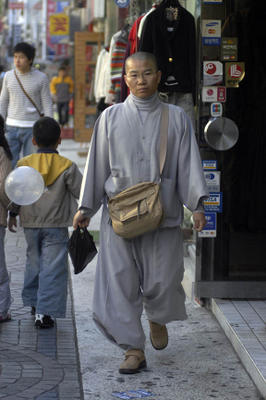
There is a Buddhist monastery next to ESS in Nampo-dong. Many days they can be heard wailing as they beat on deep-throated animal skin drums. There is nothing like planning for classes to the ancient, ethereal sound of a Buddhist drum line.
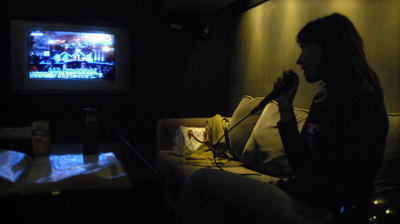
Julie and I went to a nora-bong with a friend Friday night. It's a kareoke bar. The problem with kareoke music is instead of a copy of the original song with the vocals edited out, it's a knock-off. Most of the songs are a pale immitation of the original. If it wasn't for the soju, the cheesy synthesizered version of U2's With or Without You might have bothered my sensibilities (oh shit, I have sensibilities?).

I met a drunk fisherman who had caught a flounder. He let me take a photo of him with it.

And then he handed it to me.

Watch your back while shopping in Nampo-dong. I have been creamed by these guys twice now. Got to stop listening to my iPod while shopping.

The Asia Pacific Economic Conference is going to be held in Busan in November. This is a big ass deal to the Busanites. All the Tigers are going to be here: China, Japan, Taiwan, indonesia...Did I say Japan? The city government has been frantically cleaning up, painting and re-paving everything in sight. The trains are spotless and I actually got on a bus with an automatic transmission yesterday (wow, no motion sickness). The bridge is lined with these bright white and blue APEC flags.
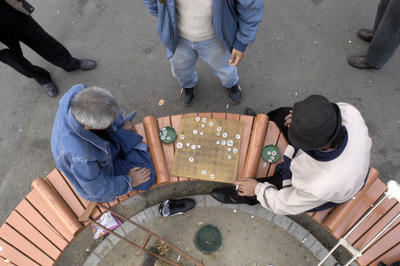
I think this is Chinese chess. Not sure. Looks complicated. The old men in Busan play it constantly. They kept looking up at me like I was crazy as I photographed them from a tree branch. What? Haven't you ever seen an American in a tree before?


Kids feeding pigeons. Man, those have got to be some paranoid pigeons. Just thirty seconds earlier the kids were trying to ensnare a pigeon in jacket.

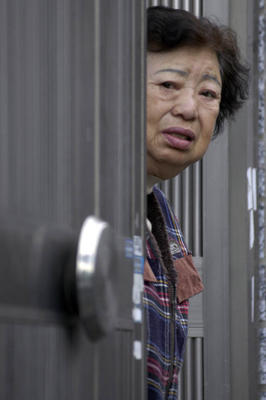
All you Western Kentucky photojournalism students need to come to Busan. The city is a veritable cornicopia of photogenic wrinkly old people waiting to be put in your portfolios.
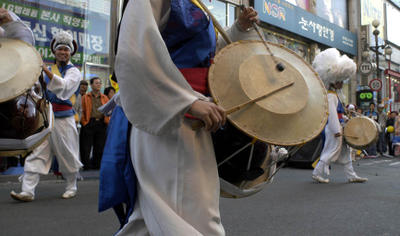




I ran across a group of traditional Korean street dancers celebrating the rice harvest in the middle of Nampo-dong. Their act is called Gilnori and has been unchanged for the last 6000 years. The Koreans love it, as indicated by the crowds of people ten rows thick gathered around the performers. Their drums are called "Buk" and their costumes are called "Minbok."

Last photo. Kids playing, uh, volleyball, I think...With their feet and heads. Nobody used their arms. Wow. It's soccolleyball! OK, that was bad.
Well, I got to go. My wrist is dying and I've racked up a whoping $3 bill at this PC bong. About mid-week I am going to update again with a story about a bully. Until then, I hope you enjoyed the photos and my long rant about Korean. Until next time...Peace! --Notes
3 comments:
haha those karaoke bars here are just the same, except if you go to a chinese one and sing chinese songs you get an actual music video and not just random shots of the beach ^_^ However, it is all synthesizer music, try singing "In da club" at a karaoke bar =P
Great site. Cool photos. The one of the monk is awesome.
Post a Comment